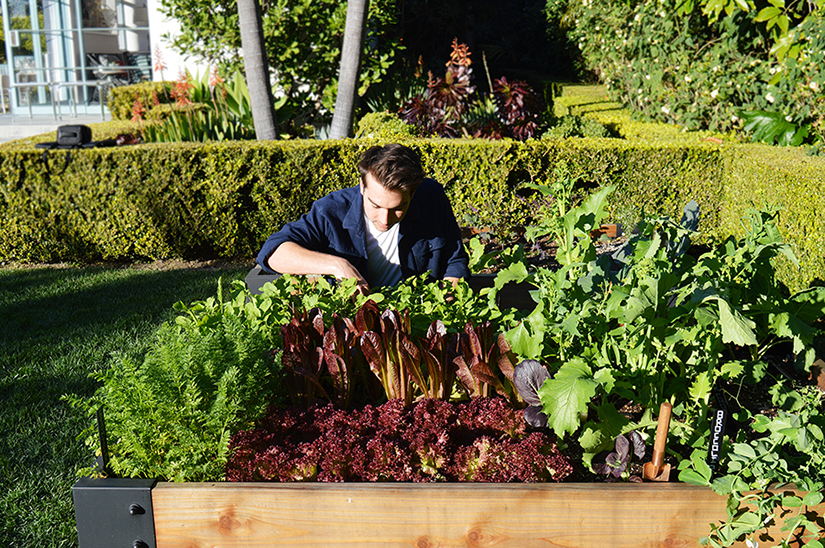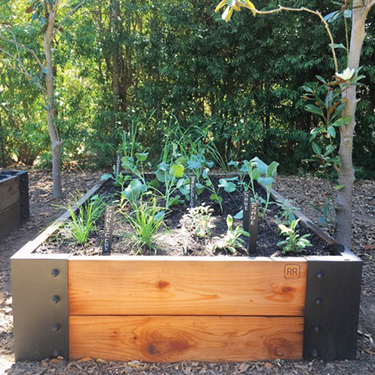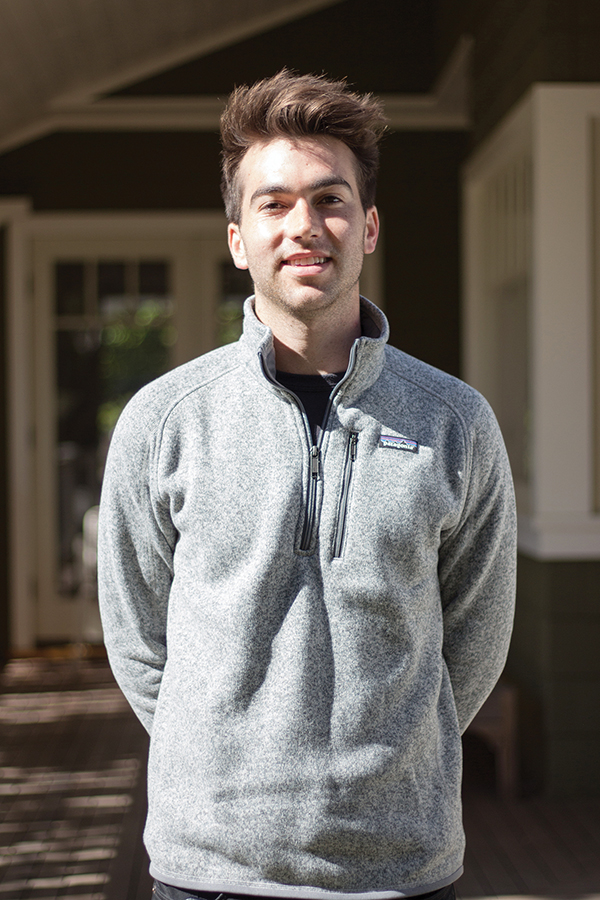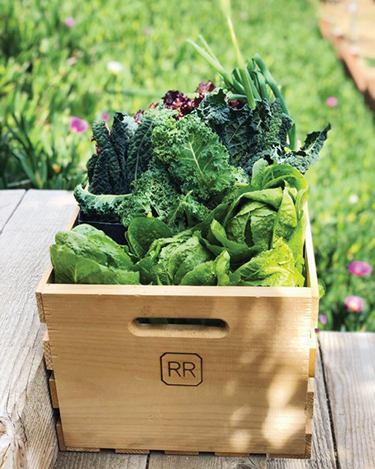By Sarah Stockman
Staff Writer
One sunny morning in February I sat in my kitchen waiting for the doorbell to ring. Any minute Palisadian Reed Newman would arrive to tell me about his vegetable garden growing company Revival Roots.
Normally when I interview someone we meet at a neutral location like Starbucks. However, I had taken Newman up on his offer on NextDoor for free garden consultations since I was curious how his company worked.
There was potentially one small hiccup: I live with my parents so I had to ask permission to invite him over. Luckily they didn’t have any problems. “Ask him about replacing sprinklers,” my mom told me. “Tell him to bring us some free plants,” my dad added.
And so I found myself waiting one Tuesday morning for Newman’s arrival.

Photo courtesy of Reed Newman
Newman, 24, grew up in West Los Angeles and Santa Monica Canyon with his twin older siblings and his parents Jeanne and Gary, who are in the entertainment industry.
“We grew up in West Los Angeles and moved to Santa Monica Canyon about six years ago,” Newman said.
He attended Windward High School before heading to Cornell University to attend the school of agriculture and life sciences.
His interest in plants started when he was 11 years old: his parents purchased a working vineyard in the Santa Ynez Valley they named Jorian Hill.

Photos courtesy of Reed Newman
“Almost every weekend, we would drive up north and enjoy the outdoors and the beautiful natural landscape,” Newman said. “I would always procrastinate on my homework, and instead work in the vineyard learning how to grow grapes for wine production.”
Newman graduated in 2016 with a degree in environmental science. Within months of graduation he had his business up and running. “I started it [Revival Roots] at the end of that summer,” Newman said. “It’s going well. I’ve received a lot of interest in it.”
He initially started the company because he thinks it’s important that everyone have access to their own fresh vegetables. “I wanted to help people with their gardens,” he said.
Essentially Newman is a gardener who specializes in vegetable gardens. Once a homeowner contacts him, he goes to their house, finds the best place to grow a garden, builds the beds, plants the plants, takes care of them as they grow and sometimes even harvests them for the homeowner.

“My goal is to make it [the gardening experience] meaningful,” Newman said. “Even with just one bed you’ll still get a meaningful harvest.”
Newman builds the six-by-three-foot planters in his home workshop. “I can build the beds within a couple of days,” he said. “Installation takes two days.”
Each bed gets a special kind of soil and a drip irrigation system. “I install drip irrigation . . . [that] allows the water to be perfectly targeted to where you plant,” Newman said. “I also use a soil blend that retains water really well.”
After the beds are built, the sprinklers put in and the soil placed, Newman plants a variety of seasonal vegetables.
Newman also provides weekly maintenance for around 80 percent of the gardens.
The remaining gardens receive seasonal maintenance every three months.
Along with planting and tending to gardens, Newman is also in regular contact with his clients. “Every couple of weeks I’ll send each client an email,” Newman said. “I always welcome my clients to contact me.”
Newman arrived promptly at 10 a.m. and after talking for a bit we headed into the front garden for my consultation.
I grew up with vegetable beds in our front yard alongside our driveway. Over the years we’ve grown all manner of vegetables and fruits—some more successfully than others. We used to grow corn and people would bring their children and grandchildren to see it. It was normal to walk outside in the morning, half awake, to find a grandmother explaining corn to her grandson.

Photos courtesy of Reed Newman
Newman and I looked at the dormant beds in my parent’s front yard. The thin wire trellis bridging the two beds looked forlorn without its summer green beans. Newman took a handful of soil and rubbed it between his fingers. He pronounced it adequate. “I would dig down eight inches and remove soil,” he said. “Then I would put in what I use.”
When I inquired whether we should get a drip water system rather than the system of sprinkler heads currently in place he shook his head. “They’re well-spaced out so it’s not necessary,” he said. The only potential issue with sprinkler heads is that they can overly saturate the plants and cause mold to grow on them.
Newman said if a homeowner already has vegetable gardens like these he wouldn’t do much besides mix in some new soil. He’s happy to just plant and maintain the garden.
We then headed into the backyard to simulate a more “normal” situation—what Newman would do if a client didn’t have beds already built.
The first thing he did was pull out his phone and open his Sun Surveyor application. The app predicts how the sun (and moon) will move in one area based on the location and time of year. He pointed his phone all over the backyard and decided that one of the far corners was perfect because his app told him it would get enough sun. “It needs to get at least five hours,” he said. Some client’s yards are not compatible for garden growing if they don’t get enough sunlight.
Next would be a decision about how many beds to install. Newman says that his clients usually have between one and four beds, but some have six or seven. Each bed, including the building of them, the soil, and sprinkler installation, costs $1,195.
We then discussed what kinds of plants to grow. He had a list of spring and summer vegetables but if there was something I wanted to grow that wasn’t on the list he would be happy to get it for me. “I’ll do my best to source any vegetable,” he said.
“Everything I use is certified organic.” The plants he sells are at cost and there’s an additional $200 a month for regular maintenance and $300 for seasonal maintenance. After my consultation I asked Newman about future plans for Revival Roots. He hopes to continue to expand his business, but not just to homeowners in the Palisades. “Eventually we want to be able to make vegetable growing more affordable,” he said.
The goal is to create do it yourself vegetable garden growing kits so that people can have gardens even if they don’t have yards. Newman says this product is still four to six months out, but he’s excited for its potential. Newman always gives free consultations to potential clients.
For more information, visit www.revivalroots.com.












You must be logged in to post a comment.